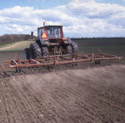 |
Is there energy in organic farming?
By senior scientist Uffe Jørgensen, Danish Institute of Agricultural Sciences
Regulations on the growing of organic crops state, inter alia, that organic farming must endeavour to “reduce the use of non-renewable resources, including fossil fuels, to a minimum”. So far, development in this regard has been limited. DARCOF has therefore initiated a synthesis of current knowledge, in order to integrate the knowledge available on the use of energy, the potential for savings, the purchase of renewable energy and the production of energy in organic farming.
Potential for improvement
The use and yield of energy in organic farming has previously been the subject of various investigations. Overall, these indicate that the diverse organic farming systems have an improved energy efficiency compared with conventional farming systems, primarily because no mineral N fertilizers are used. The investigations also show, however, that there is a considerable potential for improvement. The report will examine these possibilities and pinpoint where there is a need for development.
Energy production potential
Another topic examined in the synthesis is the potential for renewable energy production in organic farming.
The options are, for example, wind energy for the production of electricity and hydrogen or solar cells for a weed machine. There is also the option in organic farming of utilizing biomass for energy purposes, which also has the interesting possibility of being able to improve nutrient supply at farm level.
As straw is an important resource in organic farming, the use of straw for incineration purposes will probably be limited. It is, however, possible to grow nitrogen-accumulating perennial energy crops (e.g. alder and grass-clover) that are able to produce energy whilst also building up the humus layer. Grass-clover can be utilized in biogas plants, and the nitrogen and other nutrients collected can be recycled on the farm.
It is also possible to use municipal waste fractions in biogas plants to optimise the gasification process and recycle nutrients. The use of biogas production in organic farming is one of the options that will be evaluated in the report.
Completion of the report
A central aim of the synthesis is to view problems from many different angles and to discuss and synthesize the documented knowledge. It is important that not only experts on energy participate, but also experts who are able to assess the feasibility of introducing new production lines and methods in organic farming based on the existing regulations, farm structure, etc. The analysis should also include an estimate of the effect of energy production on the overall balance of greenhouse gases and nutrients, and on economic conditions.
A broad group of experts has therefore been appointed, which includes farmers, consultants and scientists from the Danish Institute of Agricultural Sciences, the University of Southern Denmark, the Folkecenter for Renewable Energy, the National Environmental Research Institute and the Danish Research Institute of Food Economics.
The synthesis will be concluded with a DARCOF report in year 2003.
|